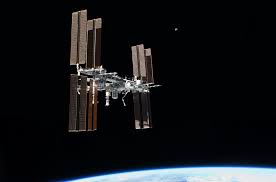9 September 2021
Russian Democracy
Leaking oxygen.
By Neil Tidmarsh
 Get out! Get out while you can!
Get out! Get out while you can!
Will that cry soon be echoing around the International Space Station, sending desperate cosmonauts scrambling for the exit? It seems that the orbiting platform – built in 1998 with a 15-year lifespan but still in operation today – is on its last legs. Vladimir Solovyov, the chief engineer at the Russian space rocket corporation Energia and a former cosmonaut, announced this week that cracks have been found on the station’s oldest part, the Russian module Zarya. The module is only used for storage and the fissures are described as “superficial”, but he suggests that they “will begin to spread over time”. He also said that 80% of the systems on the Russian parts of the station were past their expiry date, and warned of the danger of immediate and “irreparable failure” if they’re allowed to become “fully exhausted”.
The Russian space agency Roscosmos denied his claims about the cracks, but earlier this year it admitted that an air leak caused a drop in air pressure in a Russian service module used as living quarters on the station. A few months ago, a software fault on a Russian research module flipped the station through 540 degrees by randomly igniting a jet thruster. A few years ago, a 2mm hole was found on a Soyuz capsule at the station; its cause remains a mystery, although Tass has recently blamed an American astronaut, suggesting an elaborate psycho-drama worthy of the best sci-fi movies, which Nasa has dismissed. So it appears that time is indeed running out for the ISS.
Get out! Get out while you can!
It seems the same cry has been echoing round the towns and cities of Russia itself in recent weeks, as the oxygen of democracy is being sucked out of the political system through fissures which are growing ever wider with the approach of general elections later this month.
Kira Yarmysh, a spokeswoman for Alexei Navalny and his opposition movement, was sentenced to 18 months of house arrest for organising protests against Navalny’s imprisonment, but fled to Finland last week. All other leading members of Navalny’s movement have left the country in recent months. His anti-corruption foundation has been classed as extremist, so anyone associated with it could be prosecuted. Another of his activists, Lyubov Sobol, was also sentenced to 18 months of restrictions, but she escaped to Turkey before her sentence began; she suspects that it was delayed because the authorities wanted her out of the country. Another, Ivan Zhdanov, left in January, but his father has recently been jailed, he suspects in retaliation.
“They want us all out” said opposition politician Vladimir Kara-Murza. “They realise you can’t engage in politics and not be in your own country”. He has sent his family to safety in the USA but remains in Moscow and has survived two apparent novichok poisonings. Another opposition figure, Dmitry Gudkov, now in Bulgaria, says that he was forced out of Russia by threats to his family.
Journalists as well as political activists and opposition figures are also being driven out of the country. Irina Borogan and another independent journalist, Andrei Soldatov, have recently fled to London. “We felt very unsafe in Moscow” she was quoted in The Sunday Times. “We were interrogated many times.” Fearing harassment or prison if they remain in Russia, many journalists find that opposition from abroad isn’t safe either, even with today’s worldwide web; Roman Badanin, the editor of Proekt, an independent website which was recently condemned as a “foreign agent”, went into exile in the USA last week but says that the secret police are tracking, filming and abusing members of his family who remain in Russia, in what he believes is an attempt to discourage him from continuing his activism on line.
Critics of the regime have been subjected to an unprecedented crackdown since the attempted murder, arrest and imprisonment of Alexei Navalny last year, presumably no coincidence with elections looming this year. “The number of opposition candidates on the ballot has been rapidly shrinking” writes Matthew Campbell of The Sunday Times. With all “credible alternatives either dead, disqualified or in exile, the poll will be the most farcical since the downfall of communism – the end of any pretence of democracy”.
Is this crackdown the sign of a strong and confident regime? Or of a weak and fearful one, losing confidence in itself, worried by cracks in the system and desperately and artificially trying to prolong its life-span? It’s difficult not to see the International Space Station as some sort of metaphor. The ISS is unlikely to fall out of the sky just yet, and the elections are unlikely to produce any surprises, but the stresses and dangers both on the ground and up in space are clear enough for anyone to see, without the aid of an astronomer’s telescope.
Cover page image: ESA/NASA (Creative Commons).


